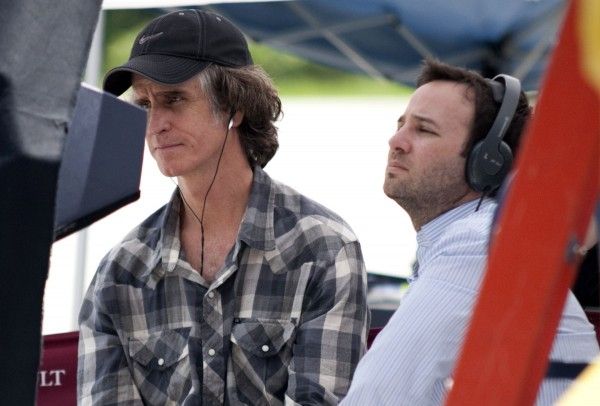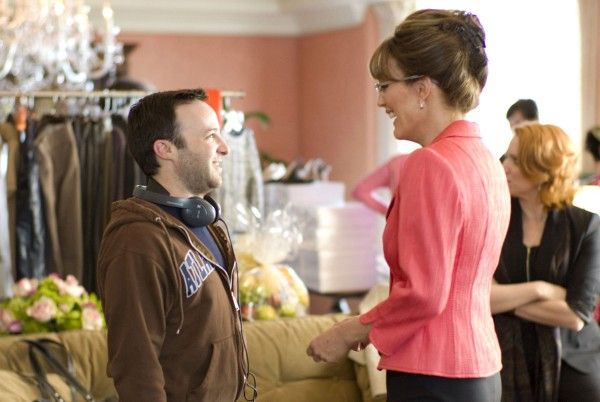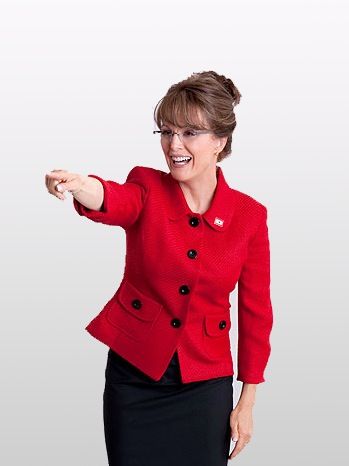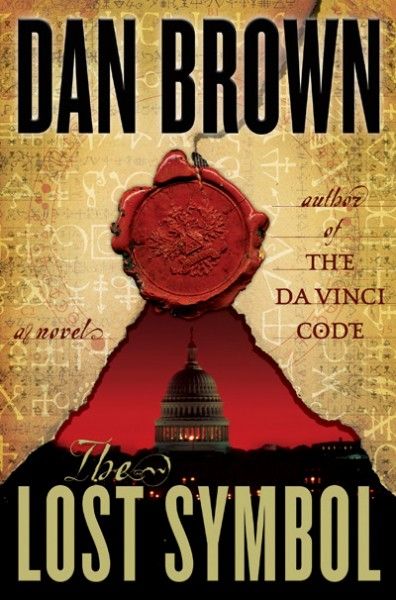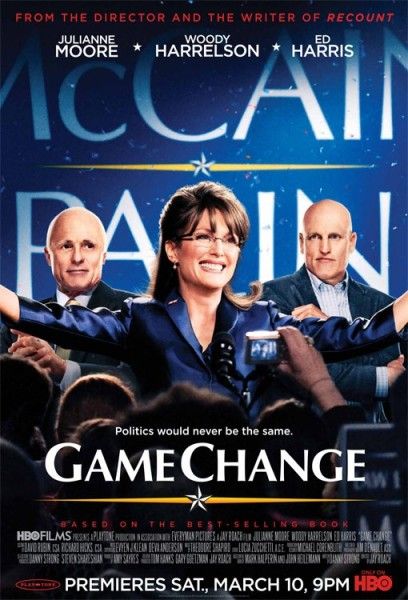HBO Films’ Game Change (premiering on March 10th) follows John McCain’s (Ed Harris) 2008 presidential campaign, from his selection of Alaska Governor Sarah Palin (Julianne Moore) as his vice presidential running mate to their ultimate defeat in the general election. Told through the eyes of McCain strategist Steve Schmidt (Woody Harrelson), the man who championed Palin for the ticket, the film revisits a defining moment in U.S. politics. It pulls back the curtain to show the intense human drama, and the strength of the performances, especially from Harris, Moore and Harrelson, create a riveting story that you just can’t stop watching, even though you know the final outcome. Directed by Jay Roach, the film also stars Ron Livingston, Peter MacNicol, Sarah Paulson, Jamey Sheridan and Bruce Altman.
During this recent exclusive phone interview with Collider, writer/co-executive producer Danny Strong talked about why he enjoys collaborating with Jay Roach (with whom he also did Recount with), why the Sarah Palin story is so intriguing and unique, the different types of research that he did in writing the film, his first reaction to seeing both Julianne Moore and Ed Harris in character, and Steve Schmidt’s reaction to the final film. He also talked about the appeal of taking on screenwriter duties for The Lost Symbol, the next Robert Langdon story from author Dan Brown, that it looks like his script for The Butler (with Lee Daniels directing) will go into production in the next three of four months, and how he’s looking forward to making his directorial debut. Check out what he had to say after the jump:
Collider: How did Game Change come about? Was it something you were approached about doing because of the reputation you had established by doing Recount?
DANNY STRONG: Yeah, it was a combination of that and the same director of Recount being attached to do this project. Jay Roach actually called me and said, “We’ve got this book, Game Change, and it’s set up at HBO, and we just want to do the [Sarah] Palin story. Do you want to write it?” And, I literally said, “Yes!,” on the phone call. I had read the book and I loved it, and I thought that was absolutely the best approach to it.
What do you enjoy about working with and collaborating with Jay Roach?
STRONG: Jay is not only the greatest guy you’ll ever meet, but he’s one of the smartest people you’ll ever meet. He’s extremely collaborative, he has all these great ideas, and he’s just the kind of guy you love to be around ‘cause he’s such a good guy, so it inspires you to do your best work. And then, he keeps me involved in the process, after the script is written. He wants me to be on set and watch cuts of the movie, in post-production, and it really just makes for a wonderful experience and it makes you want to work with him, again and again, because he’s so collaborative.
There’s an ease to Jay, and I think it comes across in his work. He’s also one of those guys where he’s just a winner. His projects just win. He did all the Austin Powers movies, and they became phenomenons. He did Meet the Parents, and it was a phenomenon. And then, he produced Borat, and it was a phenomenon. Then, he did Recount and totally switched gears, and he won an Emmy for Best Director. When you’re involved with him, you know that you’re going to be doing a project that’s going to end up at the highest quality that it can be, for what it’s setting out to be.
Was there something that interested you in politics specifically, even before doing Recount, or was it more the specific stories that you found compelling with each?
STRONG: I spent so many years of my life as a stage actor and when you do all these plays, a lot of really great plays are very politically driven. They deal with deep social issues, and that’s the kind of stuff that I love, as an audience member. So, when I initially pursued a writing career, I was writing high-concept comedies because that’s much more along the lines of the kinds of movies that Hollywood wants to make. And, when I had no success at that, I thought, “Why don’t I just do the kind of stuff that I love?,” and I instantly gravitated towards this kind of politically-charged type of drama. That’s when I had the big breakthrough with Recount.
Did you intentionally want to make sure this film easily understandable for people who aren’t typically familiar with the intricacies of politics?
STRONG: We definitely wanted to make it as accessible as possible without dumbing it down, at the same time. It feels like a smart film, but it’s one that we’re hoping grabs you by the hand and takes you along with it.
When you approach a story about politics, do you have to always make sure you don’t impose your own views on it, or is it easy to ensure that doesn’t happen?
STRONG: The approach on this two movies has been not to approach them from a partisan level and not to talk about partisan politics. Ultimately, they’re a discussion of the process of how we elect our presidents. As far as eliminating your own views, it’s just the easiest thing in the world to do. Every single journalist that has any responsibility, does it every single day. You just have to look at the facts for what they are, and try to present them in a way that’s as fair and as accurate as possible.
What do you think it is about the Sarah Palin story, specifically, that still makes it so intriguing and unique, even though it’s been awhile since all of this happened?
STRONG: Partly, what makes it so fascinating is that it’s the embodiment of the American dream. It’s a person that no one had ever heard of, including the people that picked her to be the vice presidential candidate, and then, overnight, becomes the candidate for Vice President of the United States and is potentially one heartbeat away from being President of the United States. It really is an only in America story, in which an individual who is unprepared for the national stage almost became president.
How much research did you do, outside of what was in the book, and how challenging was it to condense all of that down to a two-hour movie?
STRONG: Condensing the information down into a story is always the challenge with these kinds of projects. It’s partly why the Sarah Palin story works so well as a movie. From the moment she was picked until the end of the campaign was 60 days. It’s a great, tight frame to do a really exciting narrative. Some of the other storylines in that book went from six months to two years long, which would have been significantly harder to dramatize into a two-hour movie.
As far as my own research, besides what was already in the book, I went out and interviewed 25 members of the McCain-Palin campaign. I interviewed almost every character that’s portrayed in the movie, and many people that aren’t portrayed in the movie that were also on the campaign, and got all their stories. I wanted to confirm that the book that was our primary source was accurate, which it was – that became very clear, in the first couple of interviews – and I wanted to incorporate as much information as I could from those interviews, from the people who actually lived it and the people that we were actually portraying.
Also, I used secondary sources, such as Sarah Palin’s book, Going Rogue. That was really helpful because she wouldn’t interview with me. I was fortunate that she wrote a book that was a beat-by-beat account of how she felt about every moment of that campaign. That was extremely helpful. I also read some of the other books that have been written on the election. There have been about three or four other books.
Looking back on it, especially now that the film is finished, do you feel like having that distance from Sarah Palin and John McCain actually ended up helping you, or would you have actually wanted to sit down and talk to both of them, if they’d been willing?
STRONG: Oh, I would have loved to have talked to both of them. There’s no way that that would not have helped. But, they weren’t willing to do it, so we had to pursue the project without their interviews.
In talking to all those different people, did any one of them give you the most insight, or did any one person most effect how you approached this?
STRONG: No, it was a real consensus. I interviewed so many people, and so many people told the same story. I kept hearing the same things, over and over and over again. And then, there would be a different point of view, and there would be a number of people that would confirm that point of view. It was obvious that both points of view were valid and accurate, and we would do everything we could to try to get all the points of view into the film. It wasn’t just one story. It was a multi-dimensional story.
What was your first reaction to seeing all of these actors in character?
STRONG: I remember the first make-up test with Julianne Moore, right before we started shooting. She just walked into the room, dressed up as Sarah Palin, and all of our hearts stopped because she looked exactly like her. One of the producers, Gary Goetzman, just grabbed me and gave me this huge hug. He was so excited. It was a really neat moment. We did a little mock-up, where we just did a little Photoshop and put a brown wig on her and glasses and made her face the skin color of Sarah Palin. It took about five minutes, and we looked at it and were like, “Yeah, that’s Sarah Palin.” It was clear that she was going to be perfect. And then, it became a matter of, “Please, please, please say yes to us.” If she had said no, I don’t know what we would have done. We were all so in love with the idea of her playing the part. And also, with Ed Harris as McCain, it is spooky how much he looks like him. He just gave a tremendous performance.
Was there a scene in the film that you were most looking forward to being brought to life?
STRONG: There were a bunch. I definitely was excited about the moment we were going to shoot the scene where Julianne Moore, as Sarah Palin, is watching Tina Fey, as Sarah Palin. I just thought that was going to be a really cool meta, crazy moment. And, the way that Julianne performed it was so beautiful. You could see the pain of this, on her face. It’s also in that moment where it just becomes crystal clear to everyone what a brilliant performance it is because you’re really just feeling so much empathy for Sarah Palin while she’s watching this iconic satire of herself.
Obviously, this film probably isn’t going to change people’s perceptions of who Sarah Palin is, and that’s not what the film is even trying to do, so what are you hoping audiences take away from this film?
STRONG: Well, I hope that it makes them really think about what they value in a leader, and what kind of qualities they think a President of the United States should have. I hope we can get people thinking about that, and also thinking about the process of how we elect our presidents, and if we really want celebrity and charisma to trump substance. Maybe some people do. But, it seems to me that our presidential elections have turned more into a popularity contest than a real analysis about who really should be President of the United States. If we can get people thinking about that, then I think we will have achieved something.
What did Steve Schmidt think of the finished film?
STRONG: We offered to screen the movie for Steve Schmidt, Governor Palin and Senator McCain, and Schmidt was the only one who took us up on it. I was there when he watched it and, the second it ended, he turned to us and said, “That’s exactly what happened.”
What is the appeal of taking on a project like The Lost Symbol? Were you a fan of the Dan Brown novels, or the two previous films?
STRONG: Well, I loved the idea of doing something completely different, and thought I would have a blast doing a big studio fictional thriller. I love the character of Robert Langdon. I love the idea of a movie hero in a thriller who is able to get ahead by just his brilliance, and not with a gun or by being an action hero. I think that’s a really cool idea. And, I just love the world of the books and the movies. This one, in particular, is in the world of the Freemasons in Washington, D.C. I’ve always dug the Freemasons and the mysteries the Freemasons. I think it’s going to be a lot of fun. I think it’s going to be a great movie, so I’m really excited about it.
Are you going to approach that from an entirely new place, or will you work from drafts that were already written?
STRONG: It’s a little tricky and I can’t get that much into it right now. I haven’t entirely figured it out myself, to be honest with you.
Will you be collaborating with the director (Mark Romanek), or do you prefer to write independently?
STRONG: Every project is different, and it just depends. In this case, there is a director attached, so I will be working with him.
What else do you have on your plate right now?
STRONG: Well, one that I’m extremely excited about is called The Butler. Lee Daniels is attached to direct it, and Oprah Winfrey is attached to star in it. It’s looking like it could go into production in the next three or four months. Fingers crossed that it crosses that green light and gets going. But, it’s on the brink of happening, so that’s very exciting.
As a writer, is it difficult to spend so much time working on a project and then never know if it will actually get made or not? Is that frustrating for you, or do you just try to move on to the next thing to keep yourself occupied?
STRONG: Both. You want stuff to happen right away, but the reality is that it doesn’t. I’ve found that sitting around and obsessing about projects moving forward, when there’s actually nothing I can do about it, at a certain point, is really counter-productive. I’ve found that the way to solve that frustration is just to move onto the next thing and let the people whose job it is to get the money together or to get the studio to green light it, and either the project will happen or it won’t. All I can do, as the writer, is just keep writing. It gets to a point where it’s not even frustrating. You just have to accept that it’s the nature of what you do for a living. You have to turn stuff in and let it go, at a certain point.
What led you to want to make your directorial debut with Marshall? Was that something you had been thinking about transitioning to?
STRONG: A lot of it has just been working with Jay Roach so closely. He’s kept me involved in every stage of production, from pre-production through production and post-production, and it’s been this unbelievable film school, just being by this guy’s side. He’s also been extremely encouraging of me to direct, as well. It’s been that experience, along with having this fairly long career as an actor. It just feels like it will all come together in a directing career.
A lot of people are familiar with your acting work, but you’ve also firmly established yourself as a serious screenwriter. Is writing something that you had always wanted to do, or did something lead you to it?
STRONG: Well, it was definitely something I thought I was going to pursue, even when I was in college as a theater major. I took a lot of writing courses. But, it wasn’t until about three years into supporting myself as an actor that I decided to write a script for myself to star in, like many actors do. And, I enjoyed the process so much that I decided to pursue a separate career, as a writer, and that I wasn’t going to attach myself to scripts anymore, but just try to have two careers – one as an actor and one as a writer. But, it took several years to get the writing portion of it to happen. I think it was five years after I made that decision, before I got my first paycheck, as a writer.
Did you have a moment where you realized that you had a legitimate career as a writer as well?
STRONG: There were a couple moments. One was after I finished that first script and I gave it to a friend of mine who doesn’t pull his punches and has great taste, and he just said, “Wow, I love this. You’re a real writer.” That was a really exciting moment for me. I was like, “Wow, I can maybe really do this.” That commitment to writing was over many years, and lots and lots of rejection, which is very difficult. It got to a point where I made a decision, four years into those five years, that I was just going to keep doing it, even if I didn’t make a dime, because I loved doing it and I felt like it was a part of who I am now. I think it was at that moment that I really felt like, “I’m a professional writer now,” even though I wasn’t making any money doing it.
Do you still find yourself as passionate about acting now?
STRONG: Well, writing is definitely the focus of my energy and it’s the primary source of my income. I spend my day in and day out, working on scripts. With the acting, it’s shifted in a way that I think is really healthy. I spent 15 years pursuing any acting job I could possibly get, whether it was a commercial, a radio voice-over, any TV show, or a part in any movie, no matter what the quality of it was. I just needed to get hired because that was my source of income, and how I qualified for insurance and paid my rent. Now, because the writing career is taking care of the insurance and the rent, I can be really selective about what I want to act in. I only work in projects that I think are cool, and it’s been wonderful, getting to be selective like that, after having all those years of not being in that position.
The flipside of that is that you get to do it less because there’s less quality projects. Sometimes projects will come along that I’m excited about, and they’re not excited about me and I don’t get the part. But, that’s fine. Now, it’s a matter of fulfilling myself creatively, as an actor, as opposed to just trying to pay my rent. It’s also made the acting way better because there’s less pressure on it. I don’t feel like every single audition or every single job I get is going to be my last one, if I don’t hit it out of the park.
That’s actually a terrible mind-set to have, as an actor, because part of what makes work really good is a certain amount of relaxation and looseness and ease, particularly for acting in front of the camera. So, now I enjoy my auditions, and when I’m actually working, I enjoy being on set because I don’t have that axe having over my neck with every line I say. It’s really made everything more enjoyable, and the work is stronger.


